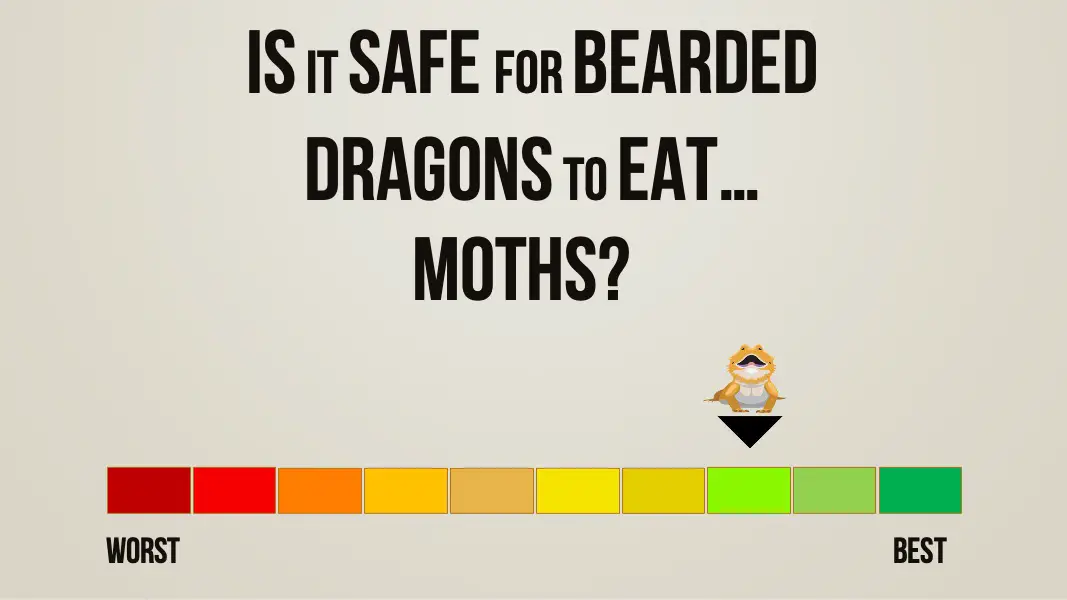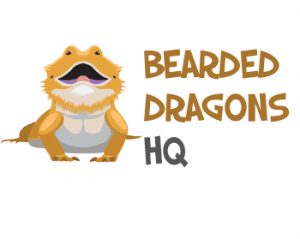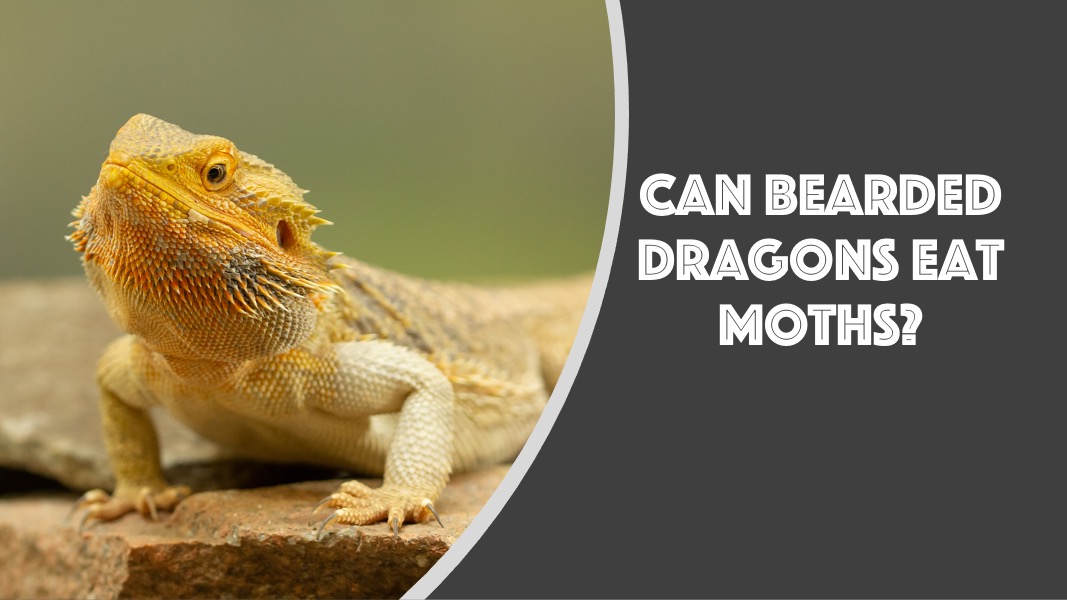Yes, bearded dragons can eat certain varieties of moths, and consume them without becoming sick. However, it is never recommended to feed your lizard moths that have been caught in the wild. Moths have minimal nutritional value, and there are more nutritious sources of protein that can be provided to them instead.
Moths, in general, aren’t the finest choice of food for your bearded dragon to eat.
If you decide to feed them moths, it’s important to understand which ones are safe and which ones aren’t. Check out the list of insects for bearded dragons.

Safe Moths for Bearded Dragons to Eat
When it comes to providing your beardie with a moth, there are a variety of solutions available. Bearded dragons are quite sensitive to certain species of moths, so you must exercise caution when handling them. Generally speaking, feeding your bearded dragon the larvae of a moth is regarded to be a safe practice.
Wax Moths
A good probability that you’ve experienced a situation where the larvae of your bearded dragon turned into wax moths if you feed them wax worms
The practice of feeding bearded dragon moths in this manner is totally acceptable. Bearded dragons do not benefit from eating wax moths or waxworms because they do not provide many nutritional benefits and are typically fatty. It is therefore preferable to only feed them on very rare occasions.
Wild Moths
A natural moth should not be consumed by a bearded dragon. You have no way of knowing what kind of parasites or diseases they may be harboring, let alone what amount of toxicity they may have. Avoid giving your beardie butterflies if you want to stay in the same category.
They carry an unknown number of chemicals and have the potential to infect your beardie with sickness.
Insect List for Bearded Dragons
- Can Bearded Dragons Eat Spiders
- Can Bearded Dragons Eat Stink Bugs
- Can Bearded Dragons Eat Superworms
What Kind of Food Should Bearded Dragons Eat?
Bearded dragons should have a varied diet that includes a variety of nutritious foods. It is critical to incorporate the appropriate amount of insect proteins and vegetables into your pet lizard’s diet in order to provide a nutritious diet. What you should provide these magnificent animals is outlined in the following advice.
Vegetables
Finding the right vegetables for your bearded dragon’s diet is critical to his or her health and wellbeing.
In order to maintain a well-balanced diet, vegetables high in vitamins and minerals are essential.
The following are examples of veggies that your bearded dragon should consume:
- Collard greens -type of lettuce.
- Mustard greens – type of lettuce.
- Bok choy – type of cabbage.
- Sweet potato
Vegetables should be the primary source of nutrition for bearded dragons, combined with protein sources such as meat. While the occasional moth is acceptable, you should concentrate your efforts on insects that are high in protein and low in fat. When picking which bug to feed your bearded dragon, keep in mind that the following are the finest choices for your pet:
Proteins
- Dubia roaches
- Crickets
- Superworms – Larvae of the black soldier fly.
Refrain from feeding your beardie the lightning bugs you catch at night while you’re out exploring.
Their toxicity to bearded dragons is quite high, and even a half-eaten one can be lethal to them.
Does the Diet of a Bearded Dragon Change as it Gets Older?
Depending on the age of your pet, you will need to adjust the amount of food you give them, the type of food you provide them, and the frequency with which they are fed.
Their requirements increase in tandem with their growth.
Baby Bearded Dragons
Babies primarily consume insects in order to supplement their expanding bodies with protein and fat. Baby bearded dragons will have a voracious appetite, and you will need to feed them at least twice a day, if not more. A baby can consume anywhere from 25 and 80 bugs every day. When you first put the insects in, allow your lizard to eat for approximately 15 minutes before removing any leftovers from the container.
It’s possible that your young lizard will turn their nose up at the greens you’ve prepared for them. Leafy greens and vegetables are vital components of their diet, and they should account for 20-30 percent of their total caloric intake. You must cut up baby food into bite-sized pieces before serving it.
Adult Bearded Dragons
At the age of 12 months, your lizard will have reached full maturity. As they grow older, they begin to consume more vegetables and fruits while consuming fewer insects. Adults only require insects to make up around 20% of their diet, which is a significant reduction from the percentage required when they were babies.
Leafy greens and vegetables should account for approximately 80% of their total caloric intake. As your dragon grows older, you will need to continue to break up his or her food. Pieces of food should be no larger than the space between their eyes in order to be visually appealing. Serving huge chunks of food can result in choking or gastrointestinal difficulties.
Bearded Dragon Supplements
Calcium is an essential mineral in your lizard’s diet since it helps to maintain a healthy calcium to phosphorus ratio. If your lizard suffers from a calcium deficit, he or she is more likely to suffer from metabolic bone disease. Collard greens, turnip greens, and mustard greens are examples of vegetables that are high in calcium.
If your bearded dragon isn’t getting enough calcium from their food, calcium supplements are available for purchase. Sprinkle the powder on their food a few times a week to keep them healthy.
How do I Keep My Beardie Hydrated?
It is critical to keep your dragon hydrated at all times. Even if you don’t have a water bowl, there’s no need to go out and acquire one right away. It is possible for your lizard to stay hydrated by providing it with nutritious food and misting its skin. Maintaining a water bowl in their tank is recommended, but it must be cleaned on a daily basis.
The presence of dirt in water serves as breeding habitat for bacteria and fungus. If you want to keep your lizard from drowning, make sure the water level isn’t too high.
How to Care for a Bearded Dragon That Has Become Dehydrated
If you find your lizard’s eyes are sunken, his skin is wrinkled, and he is lethargic, he is probably dehydrated.
You may quickly check for dehydration by pinching and pulling on the back of their skin (gently, of course) on the back of their skin. Beardies that are well-hydrated will have a more rapid release of their skin. If there is a sluggish release, you will need to start the hydration process immediately afterward. It is critical to provide quick attention to beardies who have gotten dehydrated. Alternatively, you can give them water with a syringe placed in a small basin of water.
Summary
Bearded dragons are magnificent reptiles, and there is no doubt as to why so many people are smitten with them.
As a bearded dragon owner, it’s critical to understand what foods are safe for your bearded dragon to consume and which foods can assist in providing a well-balanced diet.
Moths are not the best food to feed your beardie because there are other options. They are a poor source of protein and have a significant amount of fat compared to other foods. It is important to provide your dragon with high-quality protein and vitamin-rich vegetables in order to guarantee that it lives a long and healthy life.

